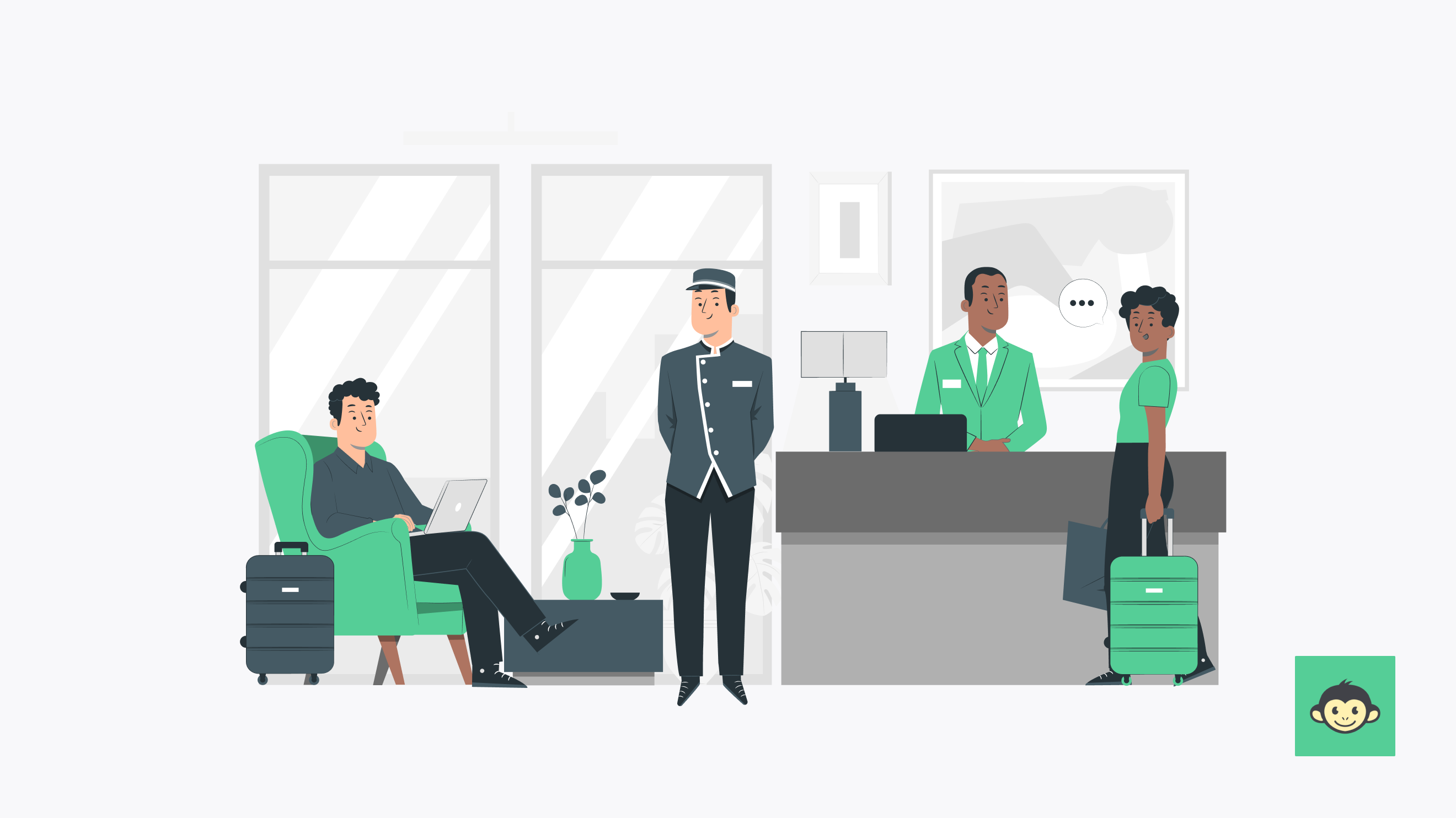Employee engagement in the hospitality industry: Challenges and strategies to try in 2024

In the world of hospitality, where creating memorable guest experiences is paramount, the role of your employees is undeniable.
But beyond simply filling rooms and serving meals, a truly engaged workforce becomes an extension of your brand, fostering genuine connections with guests and driving positive word-of-mouth. This translates into a thriving business with loyal customers and a competitive edge.
This blog dives deep into the impact of employee engagement in the hospitality industry. We'll explore the top challenges hotels face in keeping their staff motivated and invested and provide actionable strategies to cultivate a culture of engagement.
By understanding your workforce and implementing effective employee engagement strategies and initiatives, you can unlock the true potential of your hotel and create a win-win situation for both your employees and your guests.
Employee engagement in the hospitality industry: What are the objectives

Employee engagement in the hospitality industry serves several objectives, all of which are crucial for the success and sustainability of the hospitality sector and businesses. Some of these objectives include:
- Customer satisfaction: Engaged employees are more likely to provide exceptional customer service, resulting in higher levels of customer satisfaction. Satisfied customers are more likely to return and recommend the business to others, leading to increased revenue and profitability.
- Employee retention: Engaging employees helps to foster a sense of loyalty and commitment to the organization, reducing turnover rates. In an industry with high turnover, retaining skilled and experienced employees is essential for maintaining service quality and operational efficiency.
- Productivity improvement: Engaged employees tend to be more motivated, committed, and productive in their roles. They are willing to go the extra mile to ensure tasks are completed efficiently and effectively, contributing to overall operational excellence.
- Innovation and creativity: Engaged employees are more likely to share ideas, provide feedback, and actively contribute to the improvement of processes and services. This culture of innovation and creativity can lead to the development of new products, services, and strategies that give the business a competitive edge.
- Brand reputation: Employees who are engaged and satisfied with their work are more likely to represent the brand positively to customers and the public. A positive reputation as an employer can attract top talent and enhance the company's image, ultimately leading to increased business success.
- Cost reduction: Engaged employees are less likely to be absent, tardy, or disengaged, reducing costs associated with absenteeism, turnover, and poor performance. This can lead to significant savings for the organization and improve overall financial performance.
How is guest experience linked to your employee experience in hospitality?

The link between guest experience and employee experience in the hospitality industry is fundamental and symbiotic, with each directly influencing the other. Firstly, engaged and satisfied employees are more likely to deliver exceptional service and create memorable experiences for guests.
When employees feel valued, supported, and motivated in their roles, they are more inclined to go above and beyond to meet guest needs and exceed expectations. This translates into improved customer service, increased guest satisfaction, customer loyalty, and ultimately, repeat business and positive word-of-mouth recommendations.
Conversely, positive guest experiences have a profound impact on employee morale and job satisfaction. When employees witness the direct impact of their efforts on guest satisfaction, it reinforces their sense of purpose and pride in their work.
Recognition from satisfied guests validates their contributions and fosters a sense of accomplishment, further fueling their motivation and commitment to delivering exceptional service.
Furthermore, a positive guest experience can contribute to a positive work environment by reducing stress and improving employee morale. When guests are satisfied and appreciative of the service they receive, employees experience less friction and conflict in their interactions, leading to a more pleasant and rewarding work environment.
This, in turn, helps boost employee engagement and job satisfaction, creating a virtuous cycle where happy employees contribute to happy guests and vice versa.
Factors driving employee satisfaction in hospitality

Employee satisfaction in the hospitality industry is influenced by various factors that contribute to a positive work environment and a fulfilling career experience. Some of the key drivers of employee satisfaction in hospitality organizations include:
1. Supportive leadership
Effective leadership that provides clear direction, support, and recognition plays a significant role in employee satisfaction.
Managers who are approachable, communicative, and empathetic create a supportive work environment where employees feel valued and motivated to perform their best.
2. Opportunities for growth and development
Employees in the hospitality industry value opportunities for learning, skill development, and career advancement.
Providing training programs, mentorship opportunities, and clear pathways for career progression demonstrates a commitment to employee growth and fosters a sense of career fulfillment and loyalty.
3. Work-life balance
Achieving a healthy work-life balance is crucial for employee satisfaction, especially in an industry known for long hours and irregular schedules.
Employers that offer flexible scheduling, paid time off, and supportive policies for work-life balance enable employees to recharge and maintain overall well-being, leading to higher job satisfaction and retention.
4. Recognition and rewards
Recognizing and rewarding employee contributions is essential for fostering a positive work culture and boosting morale.
Whether through verbal praise, incentives, or formal recognition programs, acknowledging employee efforts and achievements reinforces desired behaviors and motivates employees to continue delivering exceptional service.
5. Positive workplace culture
A positive workplace culture characterized by teamwork, respect, and inclusivity contributes to employee satisfaction and engagement.
Cultivating a whole company culture where employees feel respected, appreciated, and supported by their peers and supervisors fosters a sense of belonging and camaraderie, leading to higher job satisfaction and overall morale.
6. Competitive compensation and benefits
Fair and competitive compensation, along with comprehensive benefits packages, are essential for attracting and retaining top talent in the hospitality industry.
Employees value compensation that reflects their skills and contributions, as well as benefits such as healthcare, retirement plans, and employee discounts, which contribute to their overall satisfaction and well-being.
7. Safe and supportive work environment
Providing a safe, clean, and supportive work environment is crucial for employee satisfaction and retention. Employers that prioritize workplace safety, employee health, and well-being demonstrate a commitment to their employees' welfare, fostering trust and loyalty among staff members.
8. Opportunities for meaningful work
Employees in the hospitality industry derive satisfaction from providing exceptional service and creating memorable experiences for guests.
Providing opportunities for hospitality employees to make a meaningful impact through their work, whether through personalized guest interactions, community involvement, or sustainability initiatives, enhances job satisfaction and fulfillment.
Employee engagement in the hospitality industry: Top challenges

Employee engagement in the hospitality industry faces several significant challenges that can impact retention, productivity, and overall business success. Some of the top challenges include:
- High turnover rates: The hospitality industry is notorious for its high turnover rates, which can hinder efforts to engage and retain employees. Factors such as demanding workloads, long hours, and seasonal fluctuations contribute to employee churn, making it difficult for businesses to maintain a stable workforce and cultivate long-term engagement.
- Workforce diversity and cultural differences: Hospitality businesses often employ a diverse workforce comprising individuals from various cultural backgrounds and demographics. Managing and engaging a diverse workforce requires sensitivity to cultural differences, effective communication strategies, and inclusive policies to ensure all employees feel valued and included.
- Work-life balance: Balancing work commitments with personal life can be challenging in the hospitality industry, where employees often work irregular hours, weekends, and holidays. The lack of predictability in scheduling can lead to burnout, fatigue, and dissatisfaction among employees, impacting their engagement and well-being.
- Limited career development opportunities: Despite the vast array of job roles in the hospitality industry, employees may perceive limited opportunities for career advancement beyond entry-level positions. The perception of a lack of upward mobility can lead to disengagement and attrition, particularly among ambitious and career-driven individuals.
- Seasonal demand and staffing challenges: Hospitality businesses often experience fluctuating demand throughout the year, resulting in seasonal variations in staffing needs. Managing staffing levels during peak periods while avoiding layoffs during slower periods can be challenging, impacting employee morale and engagement.
How to improve employee engagement in the hospitality industry: 5 Top strategies

Improving employee engagement in the hospitality industry requires a multifaceted approach that addresses various aspects of the employee experience. Here are five top strategies to enhance hospitality employee engagement:
1. Foster a positive work environment
- Cultivate a culture of respect, appreciation, and inclusivity within the organization.
- Provide opportunities for teamwork, collaboration, and social interaction among employees.
- Ensure that managers and supervisors are approachable, supportive, and responsive to employee needs and concerns.
- Celebrate successes, milestones, and achievements to reinforce a sense of pride and camaraderie among employees.
2. Invest in training and development
- Offer comprehensive training programs to equip employees with the skills, knowledge, and resources needed to excel in their roles.
- Provide opportunities for ongoing learning, skill development, and career advancement.
- Offer mentorship programs, coaching sessions, and job rotations to facilitate personal and professional growth.
- Encourage employees to pursue certifications, further education, and skill-building opportunities relevant to their roles.
3. Recognize and reward employee contributions
- Implement formal recognition programs to acknowledge and reward employee achievements, contributions, and exemplary performance.
- Provide timely and specific feedback to employees, highlighting their strengths and areas for improvement.
- Offer incentives, bonuses, and rewards for meeting or exceeding performance targets and goals.
- Foster a culture of appreciation where employees feel valued and recognized for their hard work and dedication.
4. Promote work-life balance
- Offer flexible scheduling options, where feasible, to accommodate employees' personal commitments and preferences.
- Encourage employees to take regular breaks, vacations, and time off to recharge and maintain work-life balance.
- Implement policies and practices that promote health and well-being, such as wellness programs, access to mental health resources, and ergonomic workspaces.
- Lead by example by modeling healthy work-life balance habits and encouraging employees to prioritize self-care and personal time.
5. Encourage employee involvement and empowerment
- Involve employees in decision-making processes and solicit their input, ideas, and feedback on relevant matters.
- Delegate responsibilities and empower employees to take ownership of projects, initiatives, and customer interactions.
- Provide opportunities for autonomy, creativity, and innovation in the workplace.
- Foster a sense of trust and confidence in employees' abilities to make meaningful contributions and drive positive change within the organization.
9 Employee engagement activities to try in the hospitality industry

Implementing engaging activities is essential for employee sentiment, fostering a positive work environment, and enhancing employee satisfaction in the hospitality industry. Here are nine employee engagement activities to try:
- Team-building events: Organize team-building activities such as group outings, outdoor adventures, or team sports. These activities promote camaraderie, collaboration, and communication among employees, strengthening teamwork and fostering a sense of unity.
- Employee recognition programs: Implement employee recognition programs to acknowledge and reward outstanding performance, achievements, and contributions. Recognize employees through awards, certificates, or public announcements to boost morale and motivation.
- Cross-training opportunities: Offer cross-training opportunities that allow employees to learn new skills, explore different roles, and broaden their knowledge base. Cross-training not only enhances employee development but also promotes flexibility and resilience within the workforce.
- Wellness initiatives: Promote employee wellness through wellness challenges, fitness classes, or mindfulness sessions. Encourage healthy habits and provide resources for managing stress, maintaining physical health, and improving overall well-being.
- Social events: Host social events such as themed parties, happy hours, or potluck lunches to facilitate socialization and bonding among employees. These events create opportunities for relaxation, networking, and building meaningful connections outside of work.
- Volunteer activities: Organize volunteer opportunities or community service projects for employees to give back to the local community. Volunteering fosters a sense of purpose, fulfillment, and social responsibility among employees, strengthening their connection to the organization.
- Learning lunches: Host regular "learning lunches" or educational sessions where employees can gather to discuss industry trends, best practices, or professional development topics. Invite guest speakers, industry experts, or internal subject matter experts to share insights and facilitate learning.
- Employee feedback sessions: Schedule regular feedback sessions or "town hall" meetings where employees can voice their opinions, share feedback, and participate in open discussions about organizational matters. Encourage transparency, active listening, and constructive dialogue to foster a culture of trust and collaboration.
- Employee appreciation days: Dedicate special days or events to show appreciation for employees' hard work and dedication. Provide treats, giveaways, or small tokens of appreciation, and organize fun activities or games to celebrate employees' contributions and accomplishments.
4 Employee engagement in hospitality industry examples to get inspired from

Here are four employee engagement examples specifically tailored to the hospitality industry that you can draw inspiration from:
1. Employee recognition program at a hotel chain
A hotel chain implements a comprehensive employee recognition program to celebrate outstanding performance and foster a culture of appreciation. The program includes monthly awards for employees who receive positive guest feedback, demonstrate exceptional service, or go above and beyond their regular duties.
Winners are recognized with certificates, trophies, or monetary rewards during staff meetings or special events. Additionally, the hotel encourages peer-to-peer recognition, where employees nominate their colleagues for recognition based on observed acts of excellence.
This program boosts morale, motivates employees, and reinforces desired behaviors that reward employees, leading to improved guest satisfaction and employee retention.
2. Wellness initiatives at a resort
A resort implements various wellness initiatives to promote employee well-being and work-life balance. The resort offers complimentary yoga classes, meditation sessions, and fitness activities for employees to participate in during their breaks or days off.
Additionally, the resort provides access to resources such as counseling services, stress management workshops, and nutrition seminars to support employees' mental and physical health.
By prioritizing employee wellness, the resort reduces stress, boosts morale, and enhances employee engagement, resulting in happier, healthier, and more productive staff members.
3. Cross-training opportunities at a restaurant group
A restaurant group offers cross-training opportunities to its employees to expand their skill sets and advance their careers within the organization. Employees are encouraged to learn different roles, such as server, bartender, host/hostess, and kitchen staff, through hands-on training and shadowing experiences.
The restaurant group provides incentives, such as pay increases, promotions, and recognition, for employees who successfully complete cross-training programs and demonstrate proficiency in multiple roles.
This approach enhances employee satisfaction, promotes teamwork, and increases operational flexibility, as staff members can seamlessly fill in for one another as needed.
4. Volunteer program at a hospitality management company
A hospitality management company launches a volunteer program that encourages employees to give back to the community through organized volunteer activities and charitable initiatives.
The company partners with local nonprofit organizations, shelters, and community centers to identify volunteer opportunities that align with its values and mission.
Employees are given paid time off or flexible scheduling options to participate in volunteer events, such as serving meals at a homeless shelter, participating in environmental clean-up efforts, or organizing fundraising events for charitable causes.
This program fosters a sense of purpose, camaraderie, and social responsibility among employees, strengthening their connection to the company and the community.
27 Employee engagement survey questions to ask your hotel employees

Designing an effective employee engagement survey for hotel employees requires thoughtful consideration of various aspects of their work environment, job satisfaction, and overall customer experience. Here are 27 survey questions tailored to the hospitality industry:
- On a scale of 1 to 10, how satisfied are you with your overall experience working at [Hotel Name]?
- How well do you feel your skills and abilities are utilized in your current role?
- Do you feel valued and appreciated by your supervisors and colleagues?
- How satisfied are you with the communication channels within the hotel (e.g., team meetings, email updates)?
- How would you rate the clarity of your job responsibilities and expectations?
- Are you provided with the necessary resources and tools to perform your job effectively?
- How supported do you feel in balancing your work and personal life responsibilities?
- Do you feel that your opinions and suggestions are valued by management?
- How satisfied are you with the opportunities for career growth and advancement within the hotel?
- How comfortable are you providing feedback or raising concerns to your supervisors or HR?
- How would you rate the level of teamwork and collaboration among colleagues?
- Do you feel recognized and rewarded for your contributions to the hotel?
- How satisfied are you with the training and development opportunities provided by the hotel?
- Are there any specific areas where you feel you need additional training or support?
- How well do you feel your immediate supervisor supports your professional growth and development?
- How satisfied are you with the hotel's performance feedback and evaluation process?
- How well do you feel the hotel promotes diversity and inclusion in the workplace?
- How would you rate the cleanliness and maintenance of the hotel facilities?
- How satisfied are you with the hotel's policies and procedures regarding safety and security?
- Do you feel adequately prepared and trained to handle emergency situations?
- How would you rate the hotel's efforts in promoting employee health and wellness?
- Are there any obstacles or challenges that hinder your ability to perform your job effectively?
- How satisfied are you with the opportunities for recognition and advancement available to hourly employees?
- How would you rate the hotel's efforts in fostering a positive work culture and employee morale?
- Are there any specific initiatives or programs you would like to see implemented to improve employee engagement?
- How likely are you to recommend [Hotel Name] as a great place to work to friends or family?
- Is there anything else you would like to share about your experience working at [Hotel Name]?
Role of an employee engagement platform in the hospitality industry to improve retention rates

An employee engagement platform plays a crucial role in the hospitality industry by providing a centralized platform for fostering communication, recognition, and development opportunities among employees.
In a sector known for its high turnover rates, such a platform serves as a strategic tool to improve retention rates by addressing key factors that contribute to employee satisfaction and increasing employee engagement.
Firstly, an employee engagement platform facilitates effective communication within the organization by providing channels for sharing updates, announcements, and important information in real time.
This transparent, clear, and timely communication also helps employees feel informed, connected, and engaged with the organization's goals and initiatives.
Secondly, the platform enables regular recognition and appreciation of employee contributions through features such as peer-to-peer recognition, rewards programs, and virtual applause. Recognizing employees for their hard work and achievements boosts morale, motivation, and loyalty, ultimately leading to higher retention rates.
Moreover, an employee engagement platform offers opportunities for continuous learning and development through training modules, skill-building resources, and career advancement pathways, empowering employees.
Investing in employee growth and development demonstrates a commitment to their long-term success and encourages them to stay and grow within the organization.
Conclusion
Employee engagement is a critical factor in the success and sustainability of the hospitality industry. By prioritizing initiatives to foster communication, recognition, development, and feedback, hospitality businesses can create a positive work environment where employees feel valued, motivated, and committed to delivering exceptional service.
An employee engagement platform serves as a strategic tool to facilitate these efforts, providing a centralized platform for communication, recognition, learning, and feedback.
By investing in employee engagement initiatives, recruitment and training costs, and leveraging technology to support these efforts, hospitality businesses can cultivate a loyal, motivated workforce that drives guest satisfaction, operational excellence, and long-term business success.



